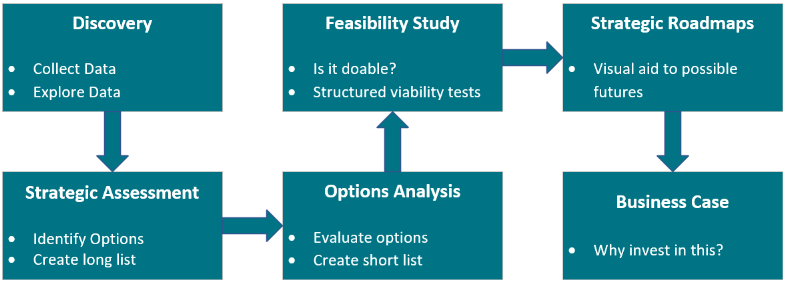Thinking before implementing strategy

I work with a team which helps implement strategy – turning strategic objectives into results. Funnily enough, when we meet a new client the strategic drivers and objectives are often far from clear. Executives come to us because they want to do something and they want to make it happen quickly. That’s fine. We can help with that. Among the first few questions we will ask are:
- Why do you want to do this?
- What will success look like for you?
- What other options have you considered to achieve that success?
This always sparks interesting conversations about the logic behind the planned investment. We don’t do this to question your judgement. We do it to clarify thinking, expose issues that could cause you grief, to help you articulate the idea to others and to ensure that you only start something you can finish successfully. Your project or initiative will never be a success if you don’t have a clear idea of what success is and how to achieve it. This need not be a linear process. There may be more or fewer steps to take along the way and some may be combined. Every client and every initiative is different but here are some of the things we do to help.
Discovery
Discovery is the gathering of information about your idea, your environment, similar ideas, lessons from your organisation and from others, approaches, methods and tools that might be useful or anything else relevant to the idea. It may include competitor analysis. The nature of the discovery phase will differ depending on whether the idea is a new product, new business, new project or something else. Discovery will produce data and information to assess a potential strategic investment.
Strategic assessment
The Strategic Assessment outlines the rationale for an investment. It sets out how the proposed investment aligns with organisational and other strategic priorities, responds to a true investment need and links to outcomes and benefits. It will identify potential ideas that could resolve the issues or develop the opportunity. It will evaluate whether any of the ideas have the potential to be viable options and is a precursor to the options analysis. The Strategic Assessment will produce a succinct summary of the problem or opportunity and a potential long list of options.
Options analysis
Options analysis refers to the practice of evaluating every possible pathway that leads to a desired outcome. To narrow the breadth of options by applying rigorous evaluation criteria before assessing the viability of any remaining options. The options analysis will usually use a combination of quantitative analysis (data) and qualitative analysis (e.g. multi criteria decision analysis) to reduce a long list of options to a short list of options with one or more preferred options. A feasibility study may be necessary to explore one or more preferred options in more detail.
Feasibility study
A Feasibility Study evaluates the technical and economic viability of a new initiative by establishing what criteria are to be met to attain the desired outcome. Can the organisation meet these criteria, given their current vision, capabilities and resources? Feasibility studies generally assume that the funds for realisation of the initiative are available. In broad terms, the purpose of the feasibility study is to identify what it would take to succeed if funds were to be granted. It may also possibly indicate the likelihood of success under different scenarios. It will usually include demand analysis, breakeven analysis etc. and review practical concerns like Where? How? When? At this stage it may be helpful to generate a strategic roadmap.
Strategic roadmap
A strategic roadmap provides a snapshot of an organisation’s direction, detailing where it is, where it wants to go, and how to get there. It outlines key strategic goals, initiatives, and milestones. It provides a simple visual bridge between strategy and implementation. That said, it can take a fair bit of work to create a simple view of something complex. Once created, the strategic roadmap is a guide and not a plan. It needs to be reviewed and updated as the business environment and priorities change. A strategic roadmap may precede or follow the preparation of a business case.
Business Case
A business case is a document to justify approval to proceed and allocation of funds for a new initiative. Business cases generally assume that the initiative is feasible and build a funding submission based on that feasibility. The purpose of the business case is to enable the initiative to be assessed against other strategic priorities for investment. It will include strategic, economic and financial analysis and will give an overview of the delivery and procurement approach.
You don’t always need to take all of these steps and you might approach your investment in different ways. We love to make ideas happen so wherever you are at with your idea right now, feel free to get in touch.
Phil Guerin, Consultant/Director, Hague Consulting Ltd. © Hague Consulting Ltd 2024.
Share this on social media
